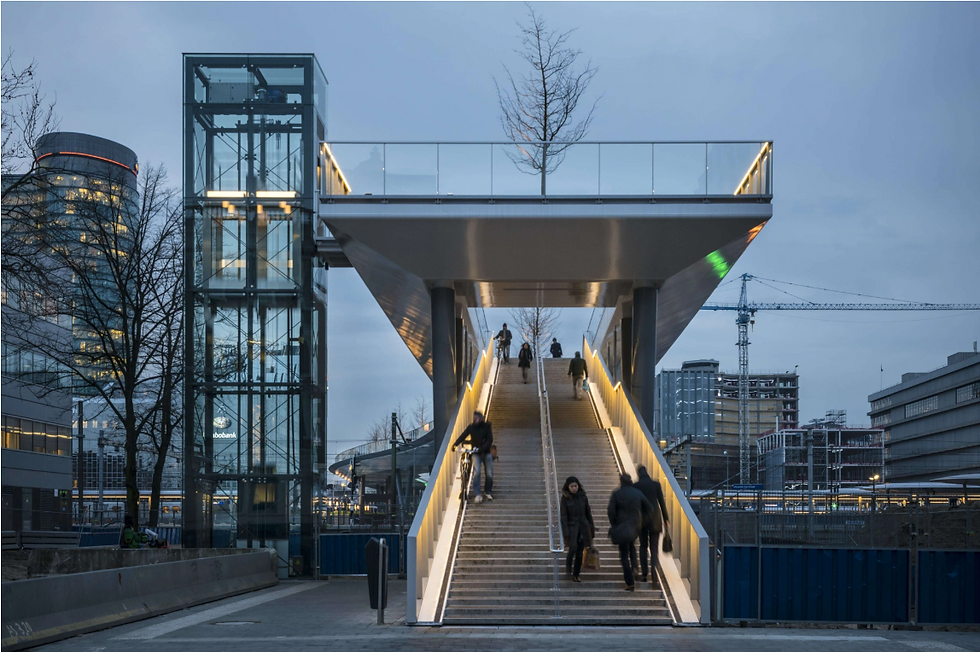How King’s Day Stimulates Our Sense of Home
- TOPOS

- Apr 8, 2025
- 3 min read
Column by Jol Abels
On King's Day, the Dutch take over public space en masse. What started as a royal tradition grew into a folk festival that colors our streets orange with flea markets, music and meeting. But how does this party contribute to our feeling of home? No other days ensure a fundamentally different use of our public space than national holidays. During New Year's Eve, the street is busy all night to watch fireworks, at carnival you are the exception if you go out undressed in the South, and during Liberation Day, public drunkenness is embraced rather than punished. This revolution in the use of public space is caused by the massive dozing or facilitation of alternative legislation on our use of space.
An alternative interpretation of public space is also possible during King's Day by changing an otherwise strongly underlined law: the public sale of properties without a permit. On April 27 (April 26 this year), streets, parks and squares throughout the country are dotted with colorful rugs and stalls. Surrounded by orange, entire attics are displayed to be sold, home-baked tompouces are offered, and around every second corner there is a young street musician showing off his skills. In short: throughout the country, public space in cities and villages is being appropriated by its residents.
This was not always the case: a celebration in honour of the incumbent first arose in 1883, in the name of King William III. With Juliana as queen in power, the celebration becomes a birthday party, and the date changes to April 30. The day consists of modest folk games, music, and there is a parade on Soestdijk where flowers can be laid for the birthday queen.
It was not until 1971, under the authority of Queen Beatrix, that the flee market became an important part of the annual celebration and the party grew into how we know it today. The flee market is used to alleviate the annual riots in Amsterdam as a result of the controversial wedding between Beatrix and her German husband Claus. Flee markets on the outskirts of the city have been tolerated before, but this time it is being organised on the Dam Square in Amsterdam, with the aim of taking over the public space with festivities, and thus giving the riots no space. And with success: many people come to the market and the riots that used to occur during Queen's Day cease.

Figure 1: Kingsday in Amsterdam. Source: Pixabay (2021)
The arrival of the free market on Dam Square also creates another phenomenon: Queen's Night. To obtain the best spots for sale, people gather in the square the night before, creating a festive atmosphere. Soon other cities also copy the flee market and the accompanying Queen's Night, and it becomes a national tradition. Nowadays, Dutch cities, parks and streets in the city designate where these markets may be held. The public spaces are appropriated in all kinds of ways by both young and old residents of the city. Appropriation is about how residents experience a space. Within appropriation, a distinction can be made between appropriation by means of objects and appropriation by means of behaviour (van Eijk, 2015). During a King's Day celebration, appropriation is achieved through objects: by decorating the streets, wearing orange clothing, and uncovering one's own belongings in public. This fulfills an emotional need that can contribute to feeling at home somewhere. But the appropriation also manifests itself in behaviour: through the interaction with local or city residents, and the sharing of an experience. The social interactions contribute to a sense of security and are essential to feel at home somewhere (Slegers, 2022). Moreover, the national character of the festival contributes to the formation of Dutch identity. And, if people feel that they belong somewhere, it is also easier to appeal to them: events will be able to get off the ground faster, and more care will be taken of the environment.
Due to the increasing commercialization and tourism of the holiday, the positive effects of King's Day on public space may be threatened. The small scale must therefore be protected, so that the public space can be appropriated. Then the party is best served by local community building and encounters, and everyone can feel at home in the public space, which is really 'ours' for that one day of the year.
References
De Jager, J. (n.d.). Koningsdag: rituelen en tradities. https://www.jefdejager.nl/koning.php
Slegers, A. (2022). Toe-eigening in de overgangszone: een kwalitatieve case study naar de bijdrage aan het thuisgevoel van bewoners in de wijk Bospolder-Tussendijken te Rotterdam. https://www.veldacademie.nl/projecten/toe-eigening-in-de-overgangszone
Koppikar, S. (2024). How festival celebrations define, and redefine, public spaces. https://questionofcities.org/how-festival-celebrations-define-and-redefine-public-spaces/







Comments